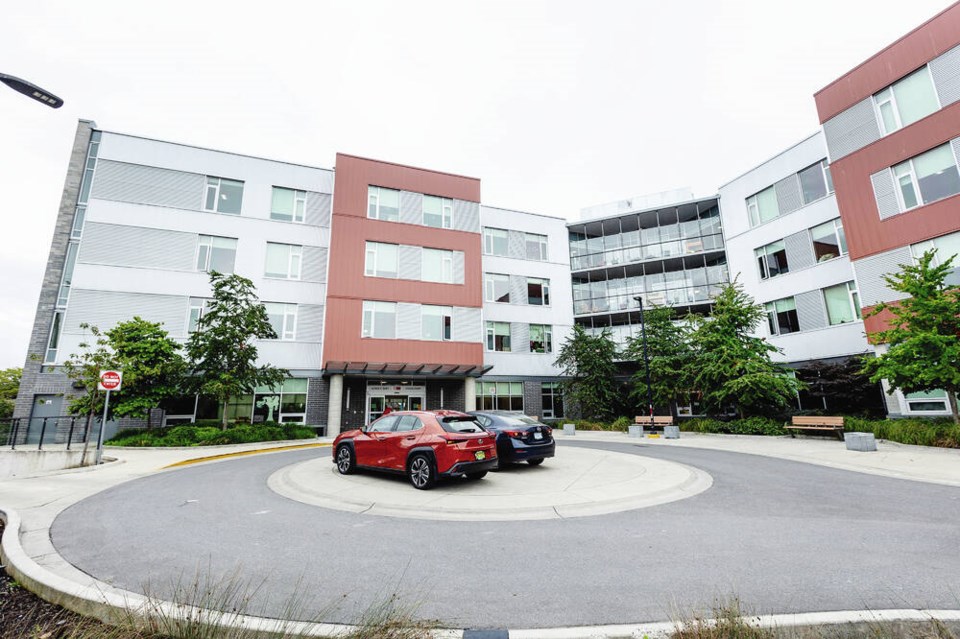Staff at a Victoria long-term care home want no-smoking rules enforced, full-time security, and specialized clinicians to deal with hard-to-house residents who regularly smoke illicit drugs, utter threats, and pose a risk to frail elderly residents.
About two years ago, Island Health created segregated “special population units” at The Summit in Victoria and Dufferin Place in Nanaimo for residents who need full-time care for complex medical and mental and behavioural health issues but who are too disruptive for other homes and hospitals.
Staff at both facilities are now ringing alarm bells saying the small group of residents, many with addictions and brain damage, regularly smoke illicit drugs such as methamphetamines, exposing staff and other residents throughout the facilities to plumes of toxic smoke.
“There’s a handful of people that are the main concern who use illicit substances within the building,” said an Island Health employee at The Summit on Hillside Avenue, speaking on the condition of anonymity.
“My biggest concern for a while now is the exposure to smoke, people smoking meth,” said the worker. “There’s also lots of verbal abuse and there’s occasional physical altercations between residents, and times when staff are injured.”
Toxic street drugs are also used in the outdoor smoking area within The Summit so that elderly residents “basically sit a few metres away from someone who smokes meth.”
It also wafts through the open windows of residents living above the courtyard.
The offending residents are talked to and told it’s not acceptable “and they are reminded of the rules but there’s no consequence, really,” said the worker.
Island Health says there’s a 24-bed special population unit for five to 10 people at the 138-bed Dufferin Place. It’s a 12-bed unit at 320-bed The Summit but workers say about another 13 residents with mostly mental health issues have been added for a total of 25 people on the facility’s first floor.
Staff at both facilities say the special population residents absorb a majority of workers time and energy.
“We are catering to the few people that seem to get all the attention and we are really forgetting about the vast majority of our residents who are regular folks who have worked all their lives and and come there and they are exposed to those substances and behaviours,” the Summit worker said.
Recognizing the demographic has changed to a younger drug- and alcohol-addicted cohort, Island Health plans to build or acquire separate facilities in Victoria and Nanaimo, but it will be a year or more before doors open.
The Summit worker says the government’s urgency in this “experiment” was about “finding a home for these people” with safety measures and staffing as an afterthought.
“The whole thing has certainly been done with good intentions,” the worker said, “but we also have to recognize, I think, that it’s failed.”
After hospital nurses raised the issue of toxic drug use in hospitals in the spring, B.C. Premier David Eby and Health Minister Adrian Dix said smoking of any kind is strictly prohibited in healthcare settings.
The B.C. Nurses Union said nurses being exposed to illicit drug smoke was unacceptable.
“The hospitals got all the attention with this issue, but in long-term care facilities, we still see the same issues,” the worker said.
Island Health says both Dufferin Place and The Summit have protection service officers either onsite overnight or available on-call from nearby hospitals.
Alanna Wrean, who identified herself in a letter to the editor as a long-time volunteer at The Summit, said she’s witnessed two residents having a fistfight at the main reception desk and a woman swearing loudly at staff while elderly residents sat a few feet away trying to enjoy a musical performance.
“Most of the elderly residents are frail and should not be subjected to this behaviour,” she wrote, adding the protection services officers shouldn’t be needed at seniors care homes unless something is very wrong.
Staff at both sites say the protection officers need to be on site 24/7. There’s also concern about drug deals and dealers “within the building and on the grounds of The Summit — we have seen that.”
The nurses union was seemingly unaware of the severity of the issues, but workers at both facilities have “a hard time believing that.”
The Hospital Employees’ Union, representing more than 60,000 health care workers, said Thursday it has heard about “significant health and safety issues at Dufferin; we know that WorkSafeBC is looking into it.”
The Summit worker said healthcare staff care about this special population — with serious medical illnesses as well as possibly brain damage or addictions, saying they wouldn’t survive on the street or in social-type housing.
“There is really no place for them and I think that’s the dilemma,” the worker said. So they are placed in long-term care where staff don’t have the training to deal with these complex behaviours, the worker added.
At the same time, the worker cites the 95-year-old grandmother living out her final years who should have a certain quality of life and be able to have her grandkids visit without being subjected to toxic drug smoke and threatening erratic behaviours.
>>> To comment on this article, write a letter to the editor: [email protected]




